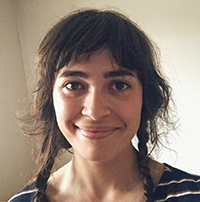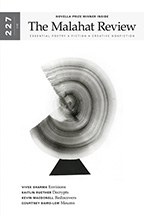Sites of Instability: Ella MacQueen-Denz in Conversation with Mandy Gutmann-Gonzalez

Mandy Gutmann-Gonzalez, whose poem "The Lion" appears in The Malahat Review's summer 2019 Issue #207, discusses gender, writing in English vs. Spanish, and their upcoming poetry collection in their Q&A with Malahat Review volunteer Ella MacQueen-Denz. Read "The Lion" here.
Mandy Gutmann-Gonzalez is from Vilches, Chile, and holds an MFA in Poetry from Cornell University. Their poetry has appeared in West Branch, Boulevard, BLOOM, Hobart, and other literary journals. Their novel in Spanish, La Pava (Ediciones Inubicalistas, 2016), follows three children who indirectly experience the trauma of the Pinochet military dictatorship in Chile. They won the 2018 Boulevard Emerging Poets Prize and have received fellowships from the Lambda Writing Retreat for Emerging LGBT Voices and the Bucknell Seminar for Younger Poets.
Your poem is set in Ohio but focuses on the image of a lion carcass. Is there a particular reason you chose a lion to feature in your poem?
The poem is part of a series responding to the Zanesville Zoo wild animal massacre. On the night of October 18, 2011, in Zanesville Ohio, Terry Thompson let loose scores of wild animals which he had been keeping in cages on his farm, then shot himself. Thompson had recently returned from a year in prison on federal weapons charges. When the police were alerted that the animals were running wild, County Sheriff Matt Lutz ordered his officers to shoot the animals. 49 animals were slaughtered. The 6 animals that survived were taken to the Columbus Zoo. That’s a brief sketch, but the full story is worth reading: https://www.esquire.com/news-politics/a12653/zanesville-0312/
I was horrified. I wrote this poem from that place of horror, though the tone of the poem is relatively calm; I didn’t want to sensationalize those events and it’s a mistake to tell readers how to feel.
“The Lion” exudes a sense of returning to a place or memory that’s not quite the same as before. The comparison between the doll’s hair and the lion’s mane “matted with old blood” as well as the contrast between the plums “soft and bruised” in the narrator’s pocket and the barren landscape creates a feeling of disenchantment. Is this poem a critique on nostalgia, or perhaps an observation of adulthood?
Those readings are available. But what interested me most was how to write a good poem. Which is to say, I wasn’t thinking about nostalgia or adulthood, I was thinking about the problem of writing about a lion carcass. I was thinking about a lion freshly killed in Ohio, what it would be like to come across that big cat body, who might come across it accidentally. You know, the killing was violent but the finding is quiet. How to go about conveying both? I’m making this sound simple when form is so complicated, the pieces have to go together and each poem requires its own set of rules, rules you can’t know in advance.
You work as an assistant professor in writing, researching topics in film and gender, and you’ve also had your creative writing work published in several journals. Do your academic focuses feed into your creative writing, and vice versa?
People have interests and these get rerouted into whatever people happen to be doing.
Gender is interesting to me because it’s complicated. I suspect everyone has a complicated relationship to gender even if it feels easy. Becoming socialized into a gender, regardless of whether or not it works or to what extent, is such a bizarre, slow, and often contradictory process. Eventually you become something like a man or a woman or not. But in the meantime, there’s a whole history there, a history of prohibitions and pleasures.
My interest in horror film came out of nowhere. I wasn’t allowed to watch horror growing up, so the pleasure of the forbidden might be part of it. The horror films that attract me are those where almost nothing happens but your senses sharpen as a result of suspense. The raised hairs on my arm, the prickling sensation at the neck, the held breath. I would like to be dommed by film, or a poem. Emily Dickinson’s statement “If I feel physically as if the top of my head were taken off, I know that is poetry” points to the importance of a visceral reaction when confronted by art.
You recently wrote a Spanish novel, La Pava, (Ediciones Inubicalistas, 2016). What did you find most challenging about writing a novel? Does the writing process change for you when you write in Spanish versus English?
La Pava is an image-driven, voice-driven novel that owes a lot to my background in poetry. Writing plot was very hard. Plot seemed big and abstract to my detail-oriented brain. To complicate matters, the novel is written from several different points of view with plot lines that intersect, which means I had to figure out four plots and how they fit together. I spent a lot of time drawing overlapping charts and timelines with rising and falling action, determining what Nino is doing when Catalina takes a bus to the desert. There’s the question of temporal continuity, which is logistical. There’s the question of dramatic arc. Then there’s rhythm: the movement within chapters, the movement between points of view, the movement of the novel overall. For each scene, I had an image in mind, and this was the poetic instinct. How do I get to that image? was the hand on the bridle, the mechanism that led me in the right direction. With each chapter, I worked toward an image. Plot might be abstract for me but suspense is a bodily reaction and because both belong to narrative, I think I was able to work my way intuitively in some areas.
Luckily novels seem to be more forgiving than short stories. Think about the whale taxonomy monographs in Moby Dick, which interrupt the plot’s forward propulsion. (Or is Moby Dick a poem?)
My writing process doesn’t change with each language but my experience of writing does (or did). One of my writing mentors once asked me why I’d never written about my experiences growing up in Chile. I realized it was because it seemed dishonest to write in English about something that had happened in Spanish. Even within the fictional world of a novel, how could I translate the place in which the novel is set—the Chilean countryside—into English? The associations words evoke would be gone, replaced by other associations. The rhythm of the campesino language is not translatable. The story would be hollow.
There’s also a stubborn part of me that doesn’t want to cater to a colonial language. Spanish is a colonial language as well, of course, but the current colonizing mantle es gringa.
There’s much one can get out of a novel in translation, but I couldn’t do it myself. Recently I read Tropical Night Falling by Manuel Puig in English. I hadn’t read it in Spanish, but there was something about the way it was translated where the cadence and turns of phrase were very Latin American to my ear. I thought it was incredible, that the translator could twist English into the idiosyncratic turns of Latin American Spanish.
A strange thing happened when I was writing this novel. I moved to the US in 2006 to study creative writing in a small liberal arts school in Illinois. By the time I was writing La Pava five years later, my day-to-day happened entirely in English. This was the first time I wrote in Spanish anything other than a grocery store list, but as I wrote this novel, memories I had not thought of in five years returned in detail: smells, textures, phrases. My life in Chile segmented off, locked away in the Spanish part of my brain. Maybe that is sad but it also felt like a wealth, treasure under the pear tree.
Congratulations on winning the 2018 Boulevard Emerging Poets Prize! That’s a great achievement. Do you have any advice for emerging poets looking to have their work published?
I heard of a poet who placed the emphasis on collecting rejection letters—100 per year—rather than on publishing. Since it’s a probabilities game in the end, this seems like a sound approach.
Do you have any current or future creative writing projects?
I’m finishing my poetry collection Edge Beast. These poems explore the liminal qualities of certain objects - WW2 bunker, whale carcass, slaughterhouse, nail polish. As a nonbinary queer person who grew up between cultures speaking two languages, I find myself questioning the naturalness of categories and exploring these objects as thresholds and sites of instability.

Ella MacQueen-Denz
* * * * * * * *









